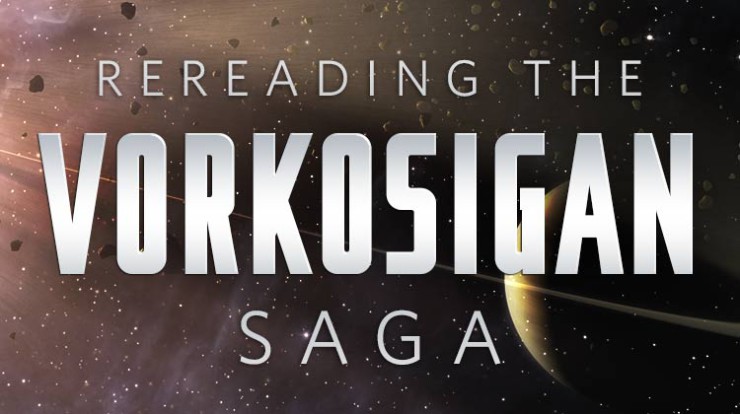Last week, we finished with Shards of Honor and its unofficial epilogue, “Aftermaths.” This week, we’re staring Barrayar! The third book in the Vorkosigan Saga in chronological order, but the fourth in publication order, Barrayar won both the Hugo Award for best novel and the Locus Award for Best Science Fiction novel in 1992. The book has been through a number of publishing formats in a lot of places, and it has a lot of cover art.
If you’d like to catch up on previous posts in the reread, the index is here. At this time, the spoiler policy permits discussion of all books EXCEPT Gentlemen Jole and the Red Queen. Discussion of any and all revelations from or about that book should be whited out.
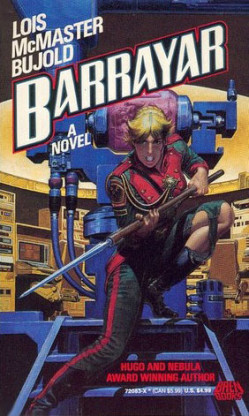 For understandable dramatic reasons, many cover artists have focused on Cordelia’s raid on the Imperial Palace and Vordarian’s execution. At right was Baen’s original paperback cover.
For understandable dramatic reasons, many cover artists have focused on Cordelia’s raid on the Imperial Palace and Vordarian’s execution. At right was Baen’s original paperback cover.
I love this image of Droushnakovi in an imperial dress uniform with Koudelka’s sword stick. The uterine replicator looks impractically large to move, and I don’t recall that Drou ever wore that uniform. But she should have been allowed to—Look how great she looks proving she’s earned it.
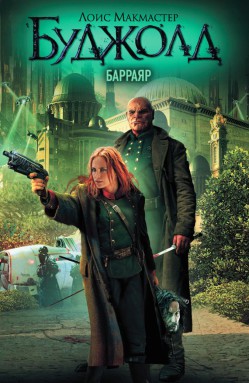 Most of these images suggest that the artists were very excited about Cordelia, but sometimes other characters suffer.
Most of these images suggest that the artists were very excited about Cordelia, but sometimes other characters suffer.
The Russian edition (left) makes Bothari look like Lurch from the Addams Family. This is neither accurate nor fair in an image where Vordarian’s decapitated head gets to look like Gary Oldman.
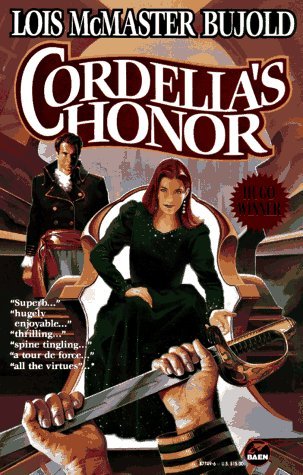 The Cordelia’s Honor cover (right), from the compilation of Shards of Honor and Barrayar, has a lot of fans. I’m glad to see the green dress that Alys Vorpatril picked for Cordelia for the Emperor’s birthday, although I wish we also got to see the ivory over-vest. I’m having a hard time working out what Cordelia is doing here. That’s not a swordstick, Cordelia doesn’t sit on thrones, why is there a matador behind her?
The Cordelia’s Honor cover (right), from the compilation of Shards of Honor and Barrayar, has a lot of fans. I’m glad to see the green dress that Alys Vorpatril picked for Cordelia for the Emperor’s birthday, although I wish we also got to see the ivory over-vest. I’m having a hard time working out what Cordelia is doing here. That’s not a swordstick, Cordelia doesn’t sit on thrones, why is there a matador behind her?
The Fictionwise ebook cover (below, left) also features a sword that is not a stick and two generic hands. The early days of computer graphics were dark and full of dangers. I’m gonna give this artist credit for trying to replicate the wavy watermark on the sword blade, and for completing their first computer graphics project.
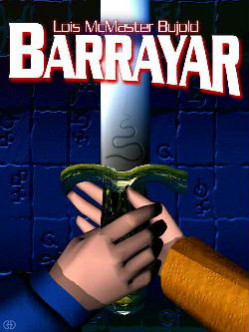 The mostly orange cover below and to the right was Baen’s second paperback edition. It’s the work of Stephen Hickman, and features his characteristic use of layers and color. I wish I could say I just know this stuff, but I don’t—I looked Hickman up on Wikipedia.
The mostly orange cover below and to the right was Baen’s second paperback edition. It’s the work of Stephen Hickman, and features his characteristic use of layers and color. I wish I could say I just know this stuff, but I don’t—I looked Hickman up on Wikipedia.
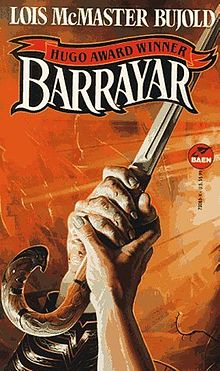 Koudelka’s sword stick features again—and once again, is not a stick. Cordelia’s hand is over Bothari’s, in his armsman’s livery. The orange background is not quite flame-y enough to evoke the fire they set in the Residence.
Koudelka’s sword stick features again—and once again, is not a stick. Cordelia’s hand is over Bothari’s, in his armsman’s livery. The orange background is not quite flame-y enough to evoke the fire they set in the Residence.
Scott Murphy’s NESFA press cover (below) shows Bothari, Drou, and Cordelia escaping the Residence with the uterine replicator and Vordarian’s head in a bag. The bag was taken from Kareen’s closet, and came from an expensive Vorbarr Sultana women’s retailer, so I’m finding the bag lacking, but I do appreciate the suggestion of Vordarian’s profile. And, I prefer the bag to the artistic license of just hauling Vordarian’s head around by its hair.
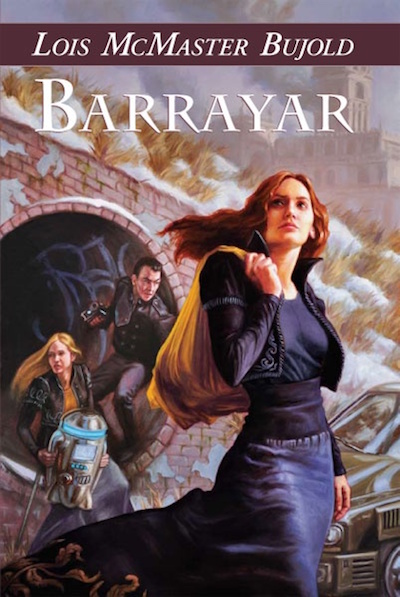
I love this, and I was excited to have an easy decision about which cover I liked best, and then I saw THIS:
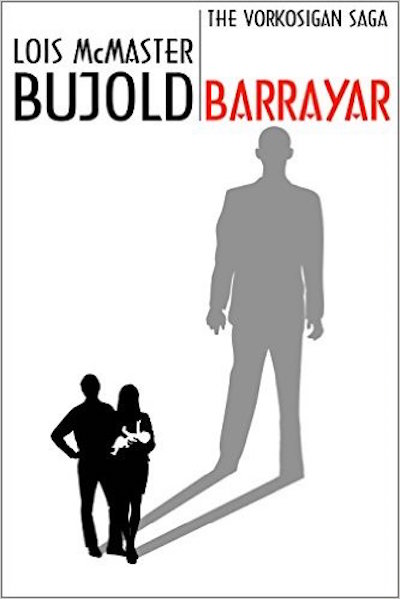
It’s like trying to choose my favorite butter bug. Do I want the symbolic resonance of Piotr’s shadow looming over Aral, Cordelia, and vulnerable baby Miles in stark monochrome, which is the CENTRAL CRISIS in this book, or the detailed genre painting of Cordelia’s effort to end the war?
In the end, the presence of Drou and Bothari, in combination with my lifelong affection for genre paintings, won the day. It was a really close call.
SUMMARY
Chapters 1 and 2 of Barrayar remind us that Beta Colony’s very serious issues with medical consent don’t make Barrayar a great place to live.
COMMENTARY
Barrayar begins approximately 26.7 hours after Shards of Honor ends. The purpose of these first two chapters is to fill in the viewers who tuned in late. Bujold is reminding us of the important things, giving us the basic orientation tour of Barrayaran culture, and pointing out some of the people who suffer from its constraints. Barrayaran culture is based on a system of class privileges. It’s sexist, and it has no tolerance for people with disabilities. These chapters are built around tension between the bastions of Barrayaran culture and those who suffer from it.
The novel opens with Cordelia’s second thoughts. I’m glad she’s having these, because I had them two weeks ago. Cordelia is wearing Vor skirts in tan, a relic of her old Betan Survey uniform and of the last moment she was comfortable on Beta Colony. Cordelia is grappling with insecurity while looking in the mirror. She has an interesting Our Town moment where she notes that her face is good for all practical purposes. And then, having taken me to that ordinary place snapping beans on the porch, she applies the same thinking to Bothari’s face, illustrating the wide range of purposes that Barrayar puts things to. Bothari is in actual uniform, this one the brown and silver Vorkosigan livery. Cordelia thinking about liveried retainers focuses on what Bothari retains. Mine focuses on the War of the Roses, and the subsequent elimination by the Tudor kings of the traditional noble privilege of livery and maintenance. This is because I know there’s a civil war in this book, and Cordelia doesn’t. Aral is also wearing a uniform today—his is imperial dress green. In contrast to “Aftermaths” where the dead were transformed from symbols back into individuals, the uniforms transform everyone into living symbols. Cordelia labels them the walking wounded, with herself as the lady auxiliary. But Cordelia was also wounded at Escobar; It’s why she’s here.
The business of the chapter is the preparations for the vote that will confirm Aral as Regent for Emperor Gregor. Aral asks Cordelia to be his liaison to Princess Kareen and Gregor. He also discusses using her to facilitate the creation of a more realistic progressive movement (the old one prefers to limit itself to “the people who matter”). Cordelia would prefer a constitutional convention. Aral absolutely refuses—it’s not that he disagrees with Cordelia on this point, it’s that he has sworn to hand power over to Gregor in sixteen years. Aral confirms that Negri’s assignment to Gregor and Kareen is a signal that he will protect the emperor’s interests if they conflict with Aral’s. Cordelia has no interest in being Empress. There’s a sort of “not Lady MacBeth-ness” to this scene, where Cordelia disavows all interest in political power. Just because Cordelia doesn’t want to be Lady Macbeth doesn’t mean that no one does.
In Vorrutyer’s quarters just after his unfortunate accident, Aral struggled to think of the Betan phrase, “a day late and a dollar short.” We see the inverse of that now, where Cordelia attempts an optimistic summary the political milieu with the Barrayaran saying “With all this manure around, there’s got to be a pony someplace.” And indeed, the guards who follow her and Aral around are a product of the enemies Cordelia is in the process of acquiring.
At the Palace to meet with Kareen and Gregor, Koudelka struggles with the stairs. At the top of the stairs, we meet Droushnakovi. She’s a Servant of the Inner Chamber and a Bodyguard, Class One. Aral has a very serious talk with four-year-old Gregor about what a regent is and what Gregor’s responsibilities are (listening to his mother and studying hard with his tutors). Aral avoids mentioning Serg at all, which we know will become a trend and will come back to bite him. His speech is pitched poorly for the understanding of a four-year-old. It’s not traumatizingly bad or anything, just not comprehensible to a kid who clearly wants to get back to playing with his robot stegosaurus. I imagine that the curriculum for four-year-old future leaders of the not-really-free world probably includes Greek, French, Russian, and really serious table manners. Negri ruins Aral’s stilted attempt at keeping the conversation age appropriate by discussing a suspected homicide. Kareen tactfully invites Cordelia to stay and visit so she doesn’t have to stand in the hall during classified conversations Negri, Illyan, Koudelka and Aral need to have down in Ops. MARK OF A TRUE PRINCESS.
Things relax as soon as the men leave the room. Gregor goes back to playing, Kareen becomes more animated, and Droushnakovi asks about Koudelka. Cordelia explains that he was wounded by nerve disruptor fire in the opening shot of the Escobar war, but does not reveal that the incident was facilitated by her own crew, which had failed to anticipate that their embrace of the democratic process in an inappropriate military context might have a downside. Beta Colony let one of Aral’s mutineers shoot Koudelka, and now it can’t provide the medical treatment he needs to fix his nervous system properly.
Kareen asks Drou to take Gregor to his lunch before taking the conversation further. It’s like Kareen is asking Drou to return Gregor to his childhood. Gregor appears to agree with my interpretation—he’s excited about cream cakes. Kareen is excited about Cordelia. Like most of the population of Beta Colony, Kareen is under the impression that Cordelia killed Vorrutyer. Cordelia passes credit to Bothari, who isn’t there and whose hand Kareen doesn’t seem interested in kissing. Serious conversation ends almost as soon as it had begun; Gregor returns. Tea is served. Gregor gets a second cream cake (but not one for his stegosaurus—tough break.) Droushnakovi sighs over opportunities for women in Beta Colony’s mixed service. Later in the evening, Droushnakovi is reassigned to Vorkosigan House and Cordelia’s personal security. I can see why Kareen thought they would suit each other. It disturbs me that Drou is delivered like a package.
In the morning, Cordelia and Drou chat about Drou’s background (lots of brothers, some Judo), and Cordelia buys a swordstick for Koudelka. The staff at the shop are patronizing and she is annoyed. She tests out merchandise by sticking it into the wall and leaning on it. I approve. Cordelia has to trade on her status as Aral’s wife to get away with it. She refers to this as the appeal to irrelevant authorities. The Barrayaran adventure continues when Cordelia gives the swordstick to Koudelka, who can’t accept it because he’s not Vor and isn’t allowed to own a private sword. Aral issues it to him to carry in the service of the Emperor, and then he can have it. For the rest of his life—he drops it and rolls it under the couch in A Civil Campaign. He’s retired at that point, so someone must have worked something else out.
Having demonstrated some aspects of Vor male privilege, Cordelia and Aral retire to the library to read and discuss Barrayaran ableism. It’s a dismal picture. Aral points out that Ensign Dubauer wouldn’t have lived on Barrayar. Cordelia declines to point out that Aral offered her his knife so she could slit Dubauer’s throat. Aral blames the Age of Isolation, which ended only 80 years ago. Barrayar has re-adopted galactic technology, at least in cities, but cultural change is slower. Bujold is a little vague on Piotr’s age here, but he’s a relic of an older time. He’s very excited about his grandson. Piotr is such a bastion of Barrayaran culture that he gets to name his first grandchild. Aral and Cordelia’s firstborn will be named after his grandfathers—Piotr Miles. They’re looking forward to choosing names for their next children.
The chapter closes with Count Vidal Vordarian storming out of the library, threatening to deny Aral his vote. Piotr insists that his son will never betray the Vor class. Vordarian (whose first name is Vidal, which is SO DELIGHTFULLY BAD GUY because it’s like the shampoo) uses a cold stare to imply that marrying Cordelia could easily become class betrayal. Piotr’s mother was also Betan so Cordelia’s mere Betan-ness isn’t grounds for the complaint. Either Vordarian isn’t as good at history as I am, or his issue with Cordelia is that she’s a soldier/astrogator, not a Betan. Vordarian should be good at history, because he’s aware that he has a claim to the throne. Aral is one of five men who have a better claim than Ezar’s. The Emperor did not name the other four, but Vordarian seems to feel he should be on that list. He has been cultivating Kareen in the hopes of advancing his candidacy, not that their was a formal campaign for the position—it’s an Imperial appointment subject to approval by the Council of Counts, not an elected office. Kareen doesn’t make Imperial Appointments—she is not even her son’s legal guardian—which makes Vidal Vordarian This week’s most ironic victim of Barrayaran sexism.
Tune in next week for chapters 3 and 4—Emperor Ezar dies, but life goes on.
Ellen Cheeseman-Meyer teaches history and reads a lot.










